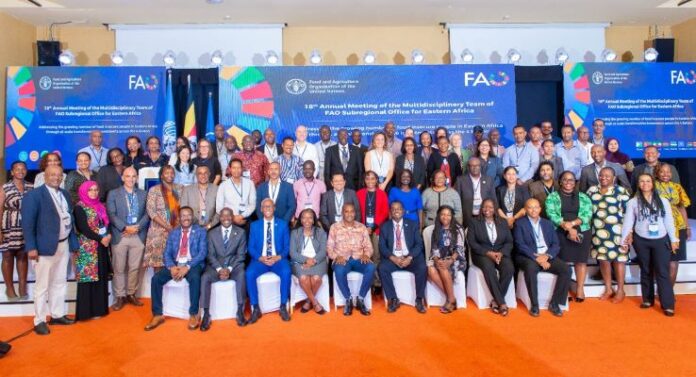Scaling up innovative practices and strengthening strategic partnerships are critical to addressing food insecurity and improving livelihoods in Eastern Africa, as emphasized during the 18th annual meeting of the FAO Subregional Office for Eastern Africa.
Held from November 12–15, 2024, in Kampala, Uganda, the meeting brought together FAO officials and key stakeholders to discuss transformative strategies for building resilience, enhancing food systems, and fostering sustainable agricultural development. The 18th Multi-Disciplinary Team Meeting (MDT) was organized under the theme, “Addressing the Growing Number of Food Insecure People in Eastern Africa through At-Scale Transformative Investments Across the 4 Betters.”
In opening remarks, Hon. Frank Tumwebaze, Uganda’s Minister of Agriculture, underscored the importance of Uganda’s longstanding partnership with FAO. He highlighted its positive impact on food production, livelihoods, and environmental sustainability while calling for continued innovation and collaboration to address challenges such as climate variability, conflict, and economic instability.
Abebe Haile Gabriel, FAO’s Assistant Director-General for Africa, noted the pressing challenges facing Eastern Africa, including climate shocks, pests, and conflicts, which threaten agrifood systems and rural development. Despite these challenges, he pointed to the region’s immense potential, citing its natural resources, strategic location, and youthful population. “This MDT meeting is an invaluable opportunity to reflect on our progress, learn from our experiences, and commit to scaling up initiatives that deliver tangible results in Eastern Africa towards ensuring better production, better nutrition, a better environment, and a better life for all, with no one left behind,” Haile Gabriel stated.
Strengthening FAO’s Capacity and Partnerships
The meeting focused on enhancing FAO’s internal processes to support the region more effectively. Farayi Zimudzi, Subregional Coordinator for Eastern Africa, stressed the importance of improving coordination across sectors, developing early warning systems, and leveraging technology in agriculture. She highlighted the critical role of partnerships, particularly with the private sector, research institutions, and civil society, in improving regional food trade, regulatory frameworks, and resilience. “The key to our success has been building strong partnerships across sectors, with a particular focus on engaging youth in agriculture,” Zimudzi said. “The digital revolution provides an opportunity to combine modern technology with traditional farming practices to create sustainable, profitable agricultural enterprises for the future.”
The MDT meeting also offered a platform for discussions with representatives of resource partners, including ECHO, USAID’s Bureau for Humanitarian Assistance, the Swiss Development Cooperation, and the UK’s Foreign, Commonwealth and Development Office, to discuss joint efforts in resilience-building across the region. Partners reaffirmed FAO’s role as a credible data source for humanitarian decision-making and stressed the importance of aligning FAO’s activities with donor strategies to maximize impact.
The meeting identified several actions to strengthen FAO’s position as a partner of choice, such as harmonizing monitoring and evaluation practices, aligning response programs with local contexts, and developing collaborative agreements for joint programming. With its flagship programmes and substantial investments in Eastern Africa, FAO remains dedicated to enhancing agricultural resilience and addressing the region’s most pressing challenges.
Showcasing Innovation and Good Practices
FAO representatives across the region shared good practices through poster presentations, and exchanged knowledge and lessons learned, in the participatory marketplace session of the meeting which focused on demonstrating scalable practices of FAO programmes in the region. Participants also engaged in a field tour to observe firsthand the tangible outcomes of FAO’s initiatives in Uganda, the host of the 18th MDT. The visit included the Aquaculture Research and Development Centre in Kajjansi, Uganda, where participants explored the progress of a South-South Cooperation (SSC) project between China and Uganda, supported by FAO. This project has achieved significant milestones, including improved rice and foxtail millet production, enhanced milk yields, and the promotion of sustainable aquaculture practices.
The tour also featured a bazaar showcasing small agro-enterprises supported through FAO programmes. Entrepreneurs shared how FAO’s interventions have strengthened their businesses, improved market access, and enhanced livelihoods, offering a glimpse into the transformative impact of innovative agricultural practices and strategic partnerships.
These visits demonstrated FAO’s commitment to scaling up successful models and fostering resilience in agrifood systems while empowering local communities to achieve sustainable agricultural development.
Eastern Africa: A Region of Contrasts
Eastern Africa faces frequent climate shocks, such as droughts and floods, which severely impact small-scale farmers. Coupled with economic inequality, political instability, and conflict, these challenges have left nearly 30 million people across the region facing severe food insecurity in 2024. According to the latest Global Food Crises Report, these trends demand urgent action to support vulnerable communities. Nonetheless, despite these challenges, Eastern Africa offers significant opportunities. The Intergovernmental Authority on Development (IGAD) projects that agricultural growth will contribute to a 134% increase in GDP per capita by 2043, driven by investments in agrifood systems.
Through its country offices and Subregional Office for Eastern Africa, FAO is uniquely positioned to support member states in addressing humanitarian crises, building resilience, and fostering climate adaptation through innovation. The annual MDT meetings remain critical milestones in reviewing progress, engaging stakeholders, and designing integrated, sustainable solutions to the region’s dynamic challenges.








